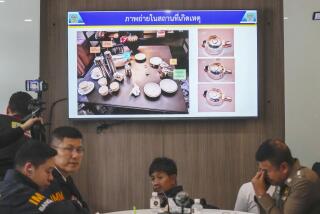FBI, Local Police Search Hotel Rooms in Kenyan Capital
- Share via
NAIROBI, Kenya — FBI agents and Kenyan police detectives on Tuesday raided a Nairobi hotel popular with Muslim businessmen and left after having combed two rooms for clues in the U.S. embassy bombings, hotel employees and guests said late Tuesday.
Although U.S. and Kenyan authorities would not comment on the raid, unnamed sources told a Nairobi newspaper that the bomb that rocked the embassy here Aug. 7 was built in the two rooms just days before the blasts.
Sources told the Nation newspaper in today’s editions that Mohammed Sadik Howaida, who has been arrested as a suspect in the bombing, checked into the hotel three days before the near-simultaneous attacks on U.S. embassies here and in Dar es Salaam, Tanzania. The bombs killed more than 250 people and injured more than 5,000.
Pakistani officials, who detained Howaida at the Karachi airport the day of the bombings, say he has confessed to involvement in the bombings. However, U.S. and Kenyan investigators said Monday that Howaida, who is now in Kenyan custody, has confessed to nothing.
A member of the family that owns the hotel told The Times on Tuesday night that he could not say whether Howaida had been a guest because investigators had taken the guest book. All that was left at the front desk was a handwritten evidence “receipt”--on lined white notebook paper--signed by an FBI agent.
“They haven’t told us anything,” said Arafat Said, who added that his elderly uncle owns the hotel.
The two rooms, meanwhile, were painted with brush strokes of dusty black fingerprint powder--indicating an extensive search that, according to another hotel employee, lasted six hours. The powder was left on tabletops, light switches, chairs and walls.
The 40-room Hilltop Lodge occupies a four-story building off Accra Road, at the juncture of another pothole-ridden street a few minutes from Nairobi’s downtown--in the sort of neighborhood where the hotel watchman had lighted a fire on the sidewalk late Tuesday to stay warm through the night.
The night clerk, Omar Jana Mboga, 22, who has worked at the hotel since 1994, said the modestly appointed but comfortably sized rooms are popular with Muslim businessmen--especially those from Mombasa, Kenya’s second-largest city, but also those from Middle Eastern nations.
Two signs at the front desk are printed in both English and Arabic. One prohibits smoking; the other, drugs. Another sign, in English, warns: “Prostitution, drunkerdness [sic] and disorderly conduct are strictly prohibited.”
Mboga said he was told by hotel staffers when he came on duty Tuesday afternoon that the FBI and Kenyan police had been there from 9:30 a.m. until 3 p.m., raiding rooms 102B and 107A.
Kule Kakule, 45, a Congolese truck driver who was staying in 102B when investigators arrived, said they told him: “Don’t be frightened. We’re just looking for clues about the bomb blast.”
Investigators fingerprinted Kakule, read a notebook, checked his passport and then returned his materials.
Mboga said the hotel manager, James Nganga, left with police. In a phone call with Said, the manager said he had not been arrested and that he was cooperating with investigators.
Mboga said he also could not recall whether Howaida stayed at the hotel. Nor could he remember the nationalities of the guests occupying the rooms during the days before the bombing.
Asked late Tuesday for the guest register, Mboga provided the piece of notebook paper. It read: “Receipt, 1 hotel register book has been taken as evidence by FBI/Kenyan police CID on 8/18/98, by special agent Elizabeth L. Hines.” CID stands for the investigative division of the Kenyan police.
Investigators said they needed the guest book to “check the names,” according to Said.
Room 107A, on the second floor and down a long hallway, holds two beds, a Formica-top desk, a single fluorescent overhead light, a chair with a torn red cushion and a white plastic lawn chair. Two large windows overlook the street.
Room 102B, up one more floor and near the stairs to the front desk, contains a single bed, the white chair and a Formica-top desk. Its sole window also looks out on the street.
The beds in both rooms were neatly made up late Tuesday with sheets and blankets. As a courtesy, management provides flip-flops for guests to use in the in-room bathrooms, which include a shower head but no tub--a common arrangement in Africa and Asia.
The rooms were empty Tuesday night because of the raid earlier in the day, Mboga said.
Times staff writer Steve Berry contributed to this report.
More to Read
Sign up for Essential California
The most important California stories and recommendations in your inbox every morning.
You may occasionally receive promotional content from the Los Angeles Times.













